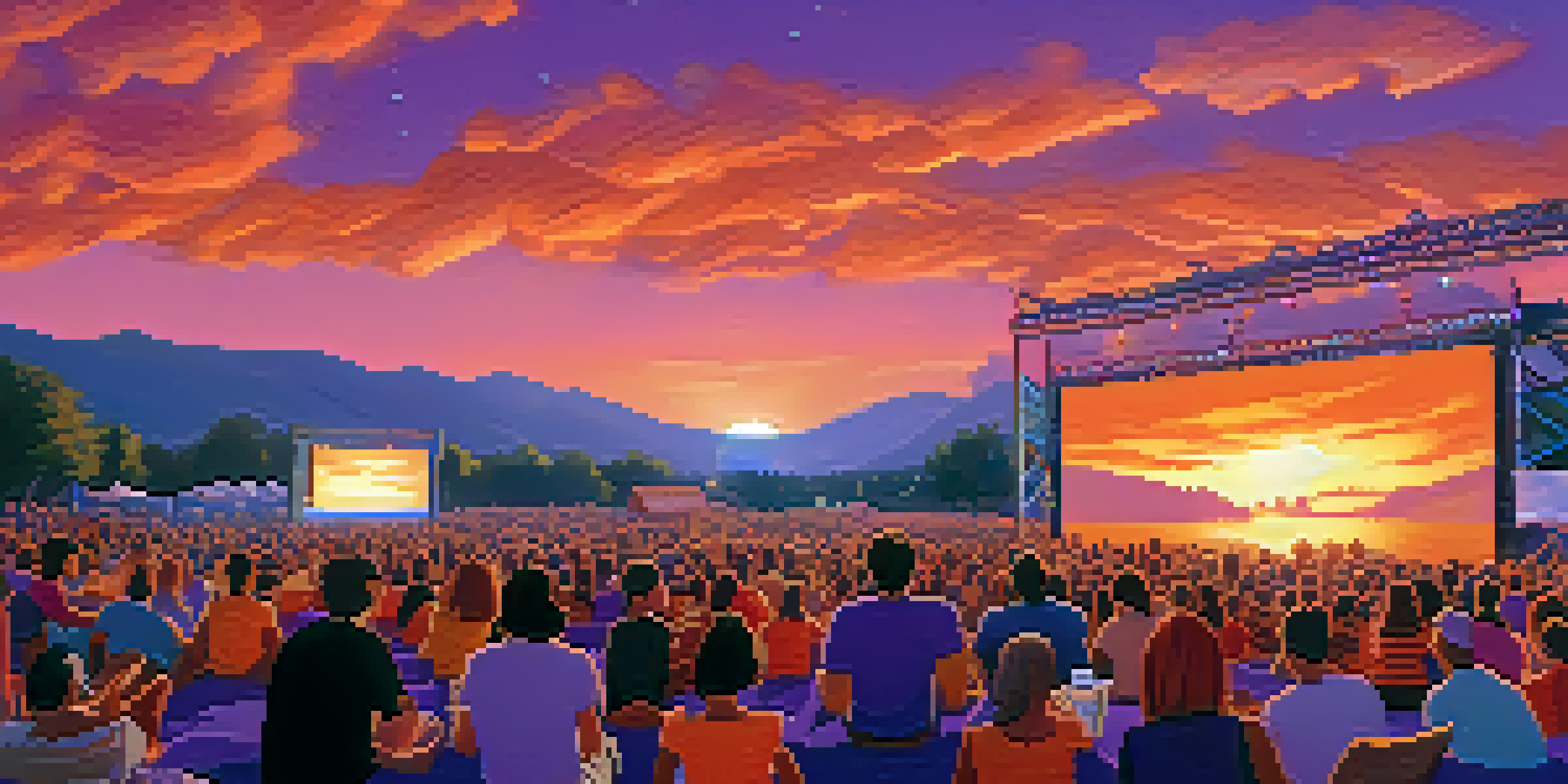The Role of User-Generated Content in Future Cinema Trends

Understanding User-Generated Content in Cinema
User-generated content (UGC) refers to any form of content created by users rather than brands or professionals. In the context of cinema, this can include fan films, reviews, and social media posts about movies. UGC has become a powerful tool for engaging audiences and creating a sense of community around films.
User-generated content is the new word of mouth. It’s more authentic, and that resonates with audiences.
For instance, platforms like YouTube allow fans to create their own interpretations of film trailers or even entire plotlines. This not only showcases the creativity of fans but also helps studios gauge public interest in potential projects. The interactive nature of UGC fosters an environment where audiences feel more connected to the films they love.
As we move forward, understanding UGC will be crucial for filmmakers and marketers alike. It provides insights into audience preferences and trends, ultimately influencing how films are marketed and developed.
The Rise of Social Media and Its Influence
Social media has revolutionized how audiences engage with cinema. Platforms like Instagram, TikTok, and Twitter enable fans to share their thoughts and creations instantly, amplifying their voices in ways that were previously unimaginable. This shift not only democratizes content creation but also allows for real-time feedback on films.

For example, a viral TikTok trend can significantly impact a film's box office performance, as seen with movies that gained traction through user-created challenges or memes. The buzz generated by social media can create anticipation and excitement, making UGC a vital component of modern film marketing strategies.
UGC Enhances Audience Engagement
User-generated content fosters a sense of community and connection between audiences and films, influencing marketing strategies.
As filmmakers and studios continue to adapt, the symbiosis between cinema and social media will grow stronger. Future trends will likely prioritize audience engagement through platforms, ensuring that the conversation around films remains vibrant and ongoing.
Shaping Narrative Through Fan Engagement
User-generated content allows fans to participate in storytelling, shaping narratives in ways that studios have begun to recognize. This engagement can manifest in various forms, from fan theories that speculate on plot twists to collaborative storytelling projects that invite fans to contribute ideas. Such involvement not only enriches the storytelling experience but also deepens the emotional investment of the audience.
The best marketing doesn’t feel like marketing. It feels like a conversation.
Take the example of popular franchises like 'Star Wars' or 'Marvel.' These worlds have dedicated fan bases that actively create content, from fan art to fan fiction, which can influence official story arcs. Recognizing and embracing these contributions can lead to richer narratives that resonate more deeply with audiences.
As the line between creators and consumers continues to blur, filmmakers may find that incorporating UGC into their narratives leads to more authentic and engaging stories. This trend signals a shift towards a more collaborative approach to filmmaking.
The Impact of Streaming Services on UGC
The rise of streaming services has transformed how audiences consume content, creating new opportunities for user-generated material. Platforms like Netflix and Hulu encourage discussions around their original content, often leading to a surge of UGC on various social media channels. This feedback loop can enhance viewer engagement and provide studios with valuable insights into audience preferences.
For example, a Netflix series might inspire viewers to create reaction videos or memes that can draw in new audiences. This organic buzz not only promotes the content but also fosters community among viewers who share similar interests, enhancing the overall viewing experience.
Social Media Amplifies Film Buzz
The rise of social media platforms allows for real-time audience feedback and creates viral trends that can significantly impact a film's success.
In the future, streaming services might even leverage UGC to shape their content offerings. By analyzing trends in user-generated content, they may tailor their productions to align more closely with audience desires, creating a more personalized viewing experience.
The Authenticity Factor in User Content
One of the key advantages of user-generated content is its authenticity. Audiences often perceive UGC as more relatable and genuine compared to traditional marketing materials. This authenticity can significantly influence audience perception and decision-making when it comes to engaging with films.
For instance, a heartfelt review or a creative fan video can resonate more with potential viewers than polished trailers. This is because UGC often reflects real emotions and experiences, bridging the gap between creators and audiences. As a result, filmmakers are increasingly recognizing the value of authentic voices in their promotional strategies.
In future cinema trends, the emphasis on authenticity will likely grow, pushing studios to consider how they can incorporate genuine audience feedback into their marketing efforts. This shift may lead to more organic and meaningful connections between films and their audiences.
Harnessing UGC for Marketing Strategies
As filmmakers and marketers look to the future, harnessing user-generated content will be essential for successful marketing strategies. By encouraging fans to share their experiences and creations, studios can amplify their reach and create buzz around upcoming films. This participatory approach not only fosters loyalty but also taps into the creative potential of the audience.
For example, campaigns that invite fans to submit their own posters or videos can generate excitement and engagement. Contests that reward the best user-generated content can also create a sense of community and ownership among fans, leading them to champion the film in their networks.
Authenticity Drives Viewer Trust
Audiences perceive user-generated content as more genuine and relatable, which can greatly affect their engagement with films.
Ultimately, the integration of UGC into marketing strategies will allow studios to create more dynamic and engaging campaigns. This trend will likely continue to evolve, making audience participation a cornerstone of future film marketing.
Challenges and Considerations of UGC
While user-generated content offers numerous benefits, it is not without its challenges. Issues such as copyright infringement, misrepresentation, and negative feedback can complicate the relationship between filmmakers and fans. Studios must navigate these concerns carefully to maintain a positive brand image while still encouraging creativity and engagement.
For instance, studios might face backlash if they are perceived as exploiting fan creations without proper credit or compensation. Additionally, negative UGC can impact a film's reputation, making it essential for filmmakers to monitor and respond to audience feedback thoughtfully.

Moving forward, establishing clear guidelines and fostering open communication with fans will be critical in mitigating these challenges. By doing so, studios can create a collaborative environment that benefits both the creators and the audience.
Looking Ahead: The Future of UGC in Cinema
As we look to the future, the role of user-generated content in cinema is poised to expand. With technological advancements and the continued growth of social media, audiences will likely have even more opportunities to influence the film landscape. Filmmakers who embrace this trend will be better positioned to create content that resonates deeply with viewers.
Moreover, as younger generations become more engaged in content creation, the demand for participatory film experiences will likely increase. This shift could lead to innovative formats and storytelling methods that prioritize audience involvement, redefining what it means to be a filmmaker and a viewer.
Ultimately, the future of cinema will be shaped by the collaborative relationship between creators and audiences. By valuing user-generated content and embracing the voices of fans, the film industry can unlock new possibilities and create more meaningful experiences for everyone involved.